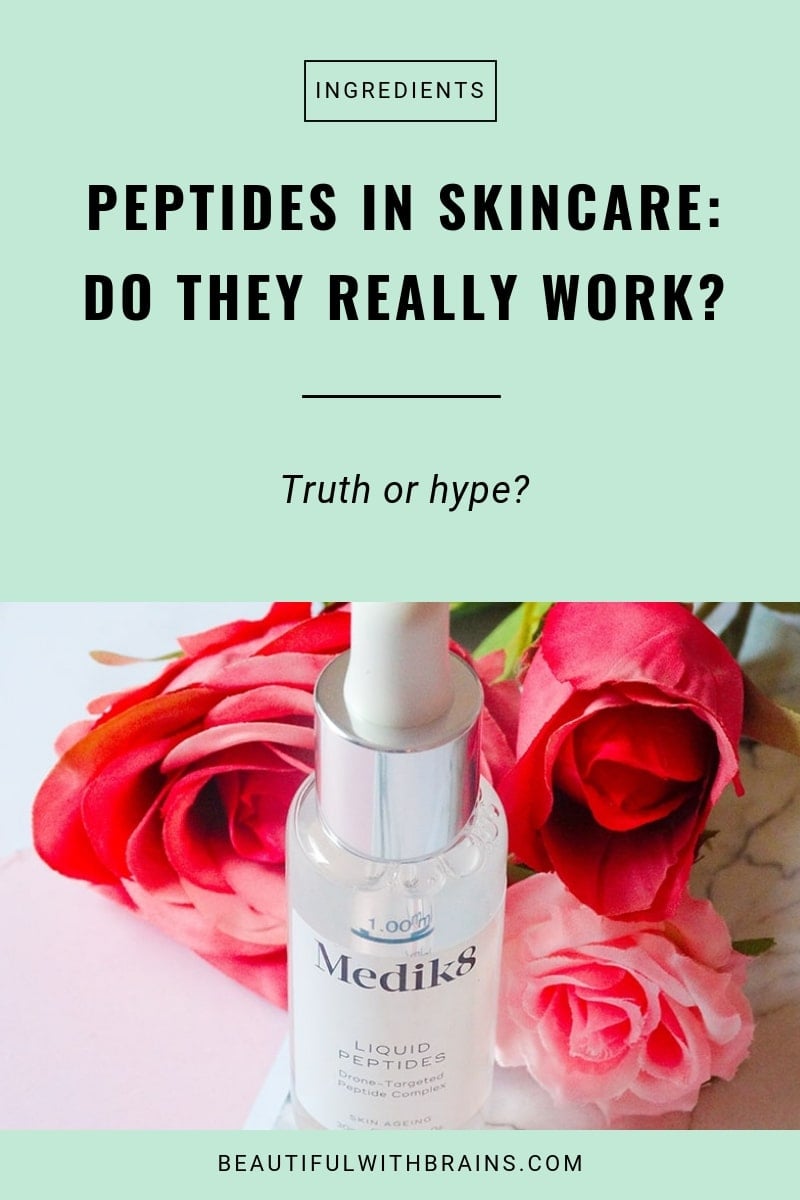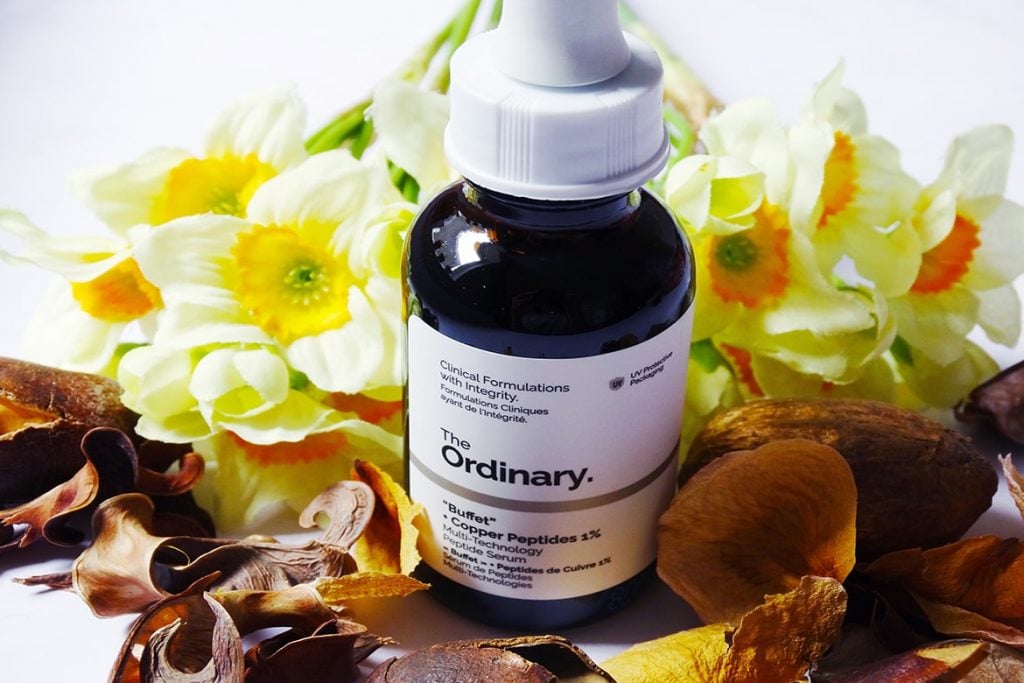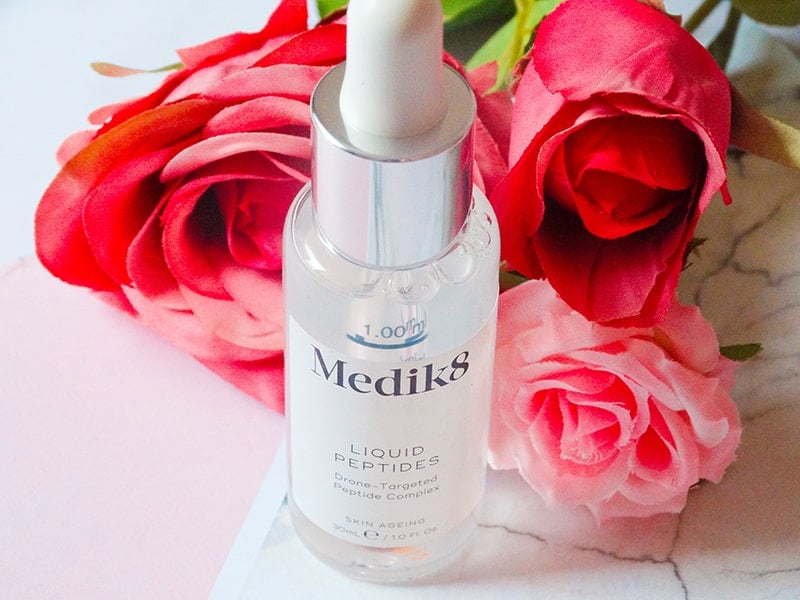
Do peptides in skincare work? This is the million dollar question. Just a quick online search brings up thousands of articles claiming they firm your skin, reverse the signs of aging, and even make you coffee (ok, maybe they don’t do that, yet). At a cost. The aisles of Sephora may be full of peptide serums, and they’re pretty expensive. Not a problem if they do what they say they do, but what if they don’t?
Here’s what the science says. Peptides are the anomaly in the skincare matrix. They shouldn’t work. Yet, it seems they do. To an extent. But, no one knows how. Or how well. Or even how much peptides you need to do the job. So many questions. So few answers. Until you get to the bottom of it, should you really invest a small fortune in a peptide serum? Mmm….
Here’s the full truth, and nothing but the truth, about whether peptides in skincare really work:
What Are Peptides?
Peptides are “small chemical compounds composed of short-chain amino acids, which are the building blocks of protein,” explains board-certified dermatologist Jennifer Herrmann. They have the same chemical structure as proteins, but are shorter in length. You can tell the number of amino acids a peptide has by looking at the name. For example, a dipeptide has two amino acids.
“Peptides are essentially fragmented portions of proteins. So when they’re used in skincare, the objective is for those fragments of collagen to stimulate collagen growth,” explains board-certified dermatologist Nancy Samolitis. “Complete, non-fragmented proteins (like collagen) are not able to be directly absorbed through the top layer of skin, so these smaller pieces are able to get deep into the cellular level.”
The most common types of peptides you’ll find in skincare are:
- Acetyl hexapeptide-3
- Copper peptides
- Palmitoyl oligopeptide
- Matrixyl-3000
- Palmitoyl pentapeptide-3
There are many others and they usually have peptide in the name, so they’re easy to spot on an ingredient list.
Related: Is Acetyl Hexapeptide-3 An Effective Alternative To Botox?
Struggling to put together a skincare routine that minimises wrinkles, prevents premature aging, and gives your complexion a youthful glow? Download your FREE “Best Anti-Aging Skincare Routine” to get started (it features product recommendations + right application order):
Benefits Of Peptides For Skin
“When used in cosmetic skin products, peptides fall into three main categories: signal peptides, carrier peptides, and those that inhibit nerve signals,” Herrmann continues. “By acting as messengers, signal peptides can trigger collagen synthesis, which then increases skin firmness.”
Here’s everything that peptides are said to do for your skin. Before you get too excited, keep in mind most of these claims come from the manufacturers. That doesn’t mean peptides doesn’t work. But, as always when someone tries to sell you something, take it with a pinch of salt.
Also, keep in mind, there are soooo many different peptides and each one does something different. So when you read the list of benefits below, don’t assume that every single peptides does all of those things. This is just a general overview of what peptides can do. You still need to read the fine print to find out what the peptides in your skincare products can do.
Now we’re clear on that, here are the benefits of peptides for skin:
- Boost collagen: Peptides can tell skin cells to produce more collagen, the protein that keeps skin firm. The more collagen your skin has, the firmer it gets and the smaller your wrinkles get.
- Hydrate skin: Peptide also boost hydration and strengthen the skin’s protective barrier, keeping skin softer and plumper for longer.
- Soothe skin: Some peptides have anti-inflammatory properties. Inflammation is one of the main cause of aging, acne, and any other skin condition. Anything that can soothe it helps keep your skin in good health.
Why Peptides Should NOT Work
Have you ever heard of the 500 Dalton Rule? A dalton is a unit of mass. Anything that’s under 500 Daltons can easily penetrate skin and anything that’s over 500 Daltons can’t. This is why you need to take a pill or get an injection if you’re ill. Most actives, including medicinal ones, can’t penetrate skin deep enough to work and heal you.
Peptides are over 500 Daltons so they should NOT be able to penetrate skin at all. How the heck can they possibly work? Some experts believe they don’t. Dermatologist Leslie Baumann, M.D. think they’re another useless fad. Maybe she’s right. But then, how can you explain the results of these studies?
Related: Types Of Peptides Used In Skincare: Which Ones Are The Best?

Do Peptides Work? (What Science Says)
First things first. Most studies on peptides are done by the manufacturers. Not exactly the most reliable of sources, are they? But, there are a few independent studies that seem to suggest peptides are effective.
An example? A 12-weeks, double-blind, placebo-controlled, split-faced clinical study comparing a moisturizer with palmitoyl pentapeptide to a placebo has found that the peptide formula significantly reduced fine lines and wrinkles by increasing the production of collagen.
Another study confirms the ability of palmitoyl oligopeptide to stimulate the production of collagen when used twice a day for six months.
How Peptides May Work
If peptides can’t penetrate skin, how the heck can they work? One theory is that peptides are cell-communicating ingredients that work through signalling. Let me say that again in plain English. When collagen breaks down, your body makes specific peptides that tell your skin it’s time to pump out more.
When you apply peptides to your skin, the same thing happens. The peptide stays on top of your skin and say, “hey skin, you’ve just lost some collagen. Make some more, please. And quickly, too!”. Your skin falls for it, and does the job. It now has more collagen so it’s more firm and elastic.
Related: 8 Science-Backed Ways To Rebuild Lost Collagen

The Truth About Peptides: Do They Really Work?
Now you know what peptides are, what they do for skin and how they may work, the only question left is: do they work? Can they do what they say on the tin? Mmm, I’m not for sure.
Although I found a couple of independent studies above, the truth is that the majority of studies on peptides were done by the manufacturer in vitro (on a Petri dish). And the couples of studies I found haven’t been replicated yet. Nor have they compared peptides to retinoids or other proven anti-aging actives. This doesn’t mean peptides don’t work yet. It just means we don’t have enough proof they work yet.
I’m not the only one who’s not a big fan of peptides yet. Most dermatologists still don’t think peptides do much of anything either. “I personally haven’t been convinced that peptides marketed to inhibit nerve signals effectively reach nerve targets (these are deep in muscles!) in large enough numbers to smooth lines as Botox can, but this may change in the future,” says Herrmann.
Samolitis agrees: “There just has not been significant scientific data on peptides for anti-aging, and they may not be as effective as the tried-and-true anti-aging ingredients like retinoids, AHAs, and antioxidants. Plus, the word ‘peptide’ can be used generically to describe any short chain of amino acids, so that term can easily be used for marketing even if the product does not contain a known active ingredient.”
How To Use Them
It really depends on the product. If they’re in a serum, use it after antioxidants or retinol serums but before moisturiser. If they’re in a moisturiser, use it in-between serum and sunscreen in the morning and as the last step of your skincare routine at night. If they’re in a cleanser, don’t bother. They’ll just be rinsed off down the drain – and they’re really useless there.
Who Should Use Them?
Peptides are generally safe for everyone to use, including people with sensitive skin. I recommend them on people who can afford to splurge on a product that’s not an essential and that’s still not 100% proven to work. If you get results, great. If you don’t, at least you will have wasted money you can afford to lose.
How Often Can You Use Them?
You can use peptides up to twice a day, once in the morning and once at night.
What Are The Best Products With Peptides?
(Some) Peptides sort of work. But until we know how and what the most effective peptides are, I don’t recommend you spend small a fortune on a serum only because it has peptides. Either try a cheap option or use products with proven anti-agers (like antioxidants and retinol) that also have peptides. That way, if they don’t work, no harm done. If they work, it’s just a bonus!
Here are the peptide products I recommend:
- Drunk Elephant Protini Polypeptide Cream ($68.00): A lightweight, super moisturising cream with every peptide you can think of. I like it because it makes my skin silky soft and perfectly hydrated. The peptides are a bonus. Available at Cult Beauty, Sephora, SpaceNK and Ulta.
- Paula’s Choice Peptide Booster ($58.00): A peptide serum with Hyaluronic Acid and probiotics to deeply hydrate and soothe skin. Available at Cult Beauty, Dermstore, Net-A-Porter, Paula’s Choice, Sephora.
- The Ordinary Buffet + Copper Peptides 1% (£28.90): I’m not a fun of Buffet, but copper peptides keep your skin working as it should, so you can have great skin. When you stop using it, you’ll see what a big difference it used to make. Available at Cult Beauty, Sephora, The Ordinary and Ulta.
The Bottom Line
Some peptides do seem to work (against all the odds!). But even then, we don’t know how well or if they do the job better than retinoids and other proven anti-aging actives (they probably don’t). I don’t recommend you use a serum just because it has peptides. But if it also contains other goodies, peptides are just an added bonus. And if they don’t work for you, no harm done.


The timing of this post couldn’t be any better! I was just looking into that new Clinique eye cream.
Off topic, but I wanted to ask, are using any Vitamin C serum at the moment or which one has worked for you? Also, if you’ve used the Drunk Elephant one?
Blush Canvas, glad you find it useful. 🙂
Yes, I’m using the Skin Active Vitamin C Serum at the moment, and am very pleased with it. Paula’s Choice makes a good one too. The Drunk Elephant one is certainly on my wishlist. It’s very well-formulated, and I like it’s fragrance-free, too.
Are you ever worried about the acidity of the skinactives vitamin c serum? On their website it says it has a ph of 2.1 which is almost near the ph of lemon juice no? I bought 2 of them when they were on sale and I like the ingredients but the acidity worries me a bit sometimes.
I’m less worried about the ph of ready made products because they usually also contain moisturizing and soothing ingredients. I’ve used their serum till the last drop and never experienced any side effects. But. if that worries you, there are plenty of products with a higher ph you can choose from.
I am using 2% BHA from the Resist line of Paula’s choice with peptides and some other products with peptides, because I am worried about skin sagging. Do you have any suggestions how to firm the contours of the face ? Love your blog ?
Bela, thanks. Glad you like it.
There really isn’t an ingredient or product that can firm and sculpt the face, like fillers and other cosmetic procedures do. But, using ingredients that promote the production of collagen helps. They include retinol (and all retinoids), vitamin c, and glycolic acid. For a full list, you can check out this post: http://beautifulwithbrains.com/2015/09/14/ways-rebuild-lost-collagen/
Hope this helps.
Thanks. ?
My pleasure. 🙂
I am looking up peptides because i have a conture cream called “Safi rania Gold” which contains “oligopeptides”.
Julina, I hope you’ve found what you were looking for. Or do you need more information?
This is terrible advice. BHAs and AHAs work best at a pH below 4.5 while peptides can be destabilized below a pH of 5.
Mimi, just because you don’t agree with one point, it doesn’t mean the whole post is wrong. Can you please give me the link to the peptides research so I can check it out?